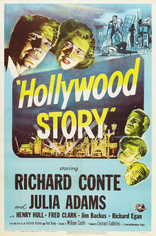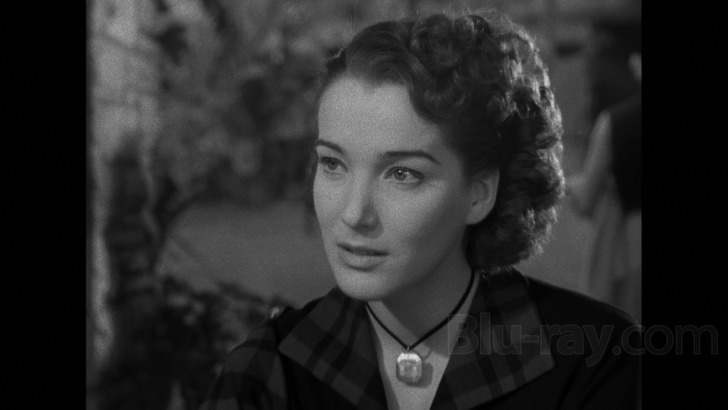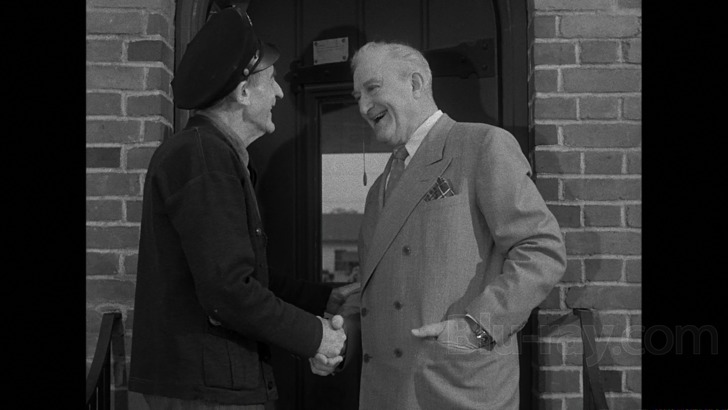Hollywood Story Blu-ray Movie
HomeHollywood Story Blu-ray Movie 
Mill Creek Entertainment | 1951 | 76 min | Not rated | No Release Date
Price
Movie rating
6.4 | / 10 |
Blu-ray rating
| Users | 0.0 | |
| Reviewer | 3.0 | |
| Overall | 3.0 |
Overview
Hollywood Story (1951)
HOLLYWOOD STORY takes aim at the darker side of the movie business. It stars Richard Conte as Larry O'Brien, a stage producer with dreams of being in the movie business, who decides to shoot a documentary about the mysterious death of a silent film director, only to find himself in danger of suffering the same fate. With cameos by silent film stars such as Helen Gibson and Francis X. Bushman, it is reminiscent of SUNSET BOULEVARD.
Starring: Richard Conte, Julie Adams, Richard Egan, Henry Hull, Fred Clark (I)Director: William Castle
| Film-Noir | Uncertain |
| Drama | Uncertain |
| Crime | Uncertain |
| Thriller | Uncertain |
Specifications
Video
Video codec: MPEG-4 AVC
Video resolution: 1080p
Aspect ratio: 1.36:1
Original aspect ratio: 1.37:1
Audio
English: DTS-HD Master Audio 2.0 Mono
Subtitles
English SDH
Discs
Blu-ray Disc
Single disc (1 BD)
Playback
Region A (B, C untested)
Review
Rating summary
| Movie | 3.0 | |
| Video | 3.5 | |
| Audio | 3.5 | |
| Extras | 0.0 | |
| Overall | 3.0 |
Hollywood Story Blu-ray Movie Review
Reviewed by Jeffrey Kauffman July 15, 2020 Note: This film is available as part of Hollywood Story / New Orleans Uncensored.
Kit Parker Films assembled three interesting collections called Noir Archive Volume 1: 1944-1954, Noir Archive Volume 2: 1954-1956 and Noir Archive Volume 3: 1957-1960, but all three of those volumes were also branded with the Mill Creek
Entertainment logo, despite one “helpful” member sending me a seemingly very insistent private message, when the first volume was
announced and was bearing the
Mill Creek Entertainment name in our database, “informing” me that “Mill Creek had nothing to do with this.” Mr. Parker himself actually
sent me an email
clarifying a kind of partnership which resulted in both entities being listed on the releases (and indeed Mill Creek Entertainment had at least
something to do with them), but the upshot is Mill Creek Entertainment itself has now re-released New Orleans Uncensored, which
was
featured in the second volume of Kit Parker’s offerings, along with Hollywood Story, in a double feature that offers two lesser remembered
films helmed by the venerable William Castle.

Sunset Boulevard rightfully remains one of the best remembered films that basically ripped the scab off of the motion picture industry, and it’s also notable for its repeated references to and utilization of stars from the silent era. One little data point which may have escaped even ardent fans’ notices is with regard to the name of the character played so unforgettably by star Gloria Swanson: Norma Desmond. It seems like a perfectly perfect “Hollywood” type name, and in fact it was: the character’s moniker is an aggregate of sorts of two names not just associated with the silent era, but with each other: actress Mabel Normand (hence, Norma) and William Desmond Taylor (hence Desmond). Taylor was the victim of one of the most sensational murders in Hollywood history, a case which has never been officially solved, though Normand was one of scores of people that the press at least suggested could be a viable suspect.
Sunset Boulevard’s success no doubt helped spark what became Hollywood Story, but the actual tale this film tells is a not so slightly disguised reworking of aspects of Desmond’s murder. The film is narrated by agent Mitch Davis (Jim Backus), who welcomes his erstwhile college chum Larry O’Brien (Richard Conte), now a successful producer, to Hollywood, after O’Brien decides to move to the west coast from New York. Davis has already scoped out a studio for O’Brien to rent, and when they tour the dilapidated site (the old Chaplin studios were utilized), the facility’s elderly guard John Miller, AKA Pops (Houseley Stevenson), takes them into the bungalow where a director named Franklin Ferrara was murdered in 1929 (an opening vignette iin the film kinda sorta shows the killing, albeit without overtly revealing the murderer, of course).
Seemingly instantaneously, O'Brien becomes obsessed with the Ferrara murder and decides to make a film about it, which in turn stirs up all sorts of trouble for no apparent reason. O'Brien's partner and financier Sam Collyer (Fred Clark) seems very energized about the film not going forward, a cop named Bud Lennox (Richard Egan) just shows up out of nowhere to offer O'Brien help should he need it (guess how that one works out), and a pretty woman named Sally Rousseau (Julia Adams), daughter of a famous actress linked to Ferrara and who was one of many suspects in his unsolved murder decades ago, appears to beg O'Brien not to do the project. O'Brien remains undeterred, however, and soon enlists the aid of washed up screenwriter Vincent St. Clair (Henry Hull), a scenarist who wrote many of Ferrara's films, but whose drinking problem has meant he's spent the last two decades unemployed.
O'Brien continues to follow a number of leads in an attempt to figure out who might have killed Ferrara and why, with Sally tagging along as a putative (and woefully underdeveloped) love interest. The film is notable for working in at least a few cameos of stars from the silent era like Francis X. Bushman and Helen Gibson, along with a quick assist from an uncredited Joel McCrea in one "backstage" scene. There's actually quite a bit of rather interesting content here, but the film is hobbled by its brevity and lack of follow through on any number of fronts, not to mention a denouement that is probably overly melodramatic and maybe even a little silly.
Still, the film's underlying mystery is intriguing, and the film is filled with some fun supporting performances. Fred Clark gets to stew and stomp his feet on more than one occasion, in what may or may not be an example of flagrant "red herring"-ism, and Jim Backus is also fun in an admittedly underwritten role as a guy with some "history" with O'Brien. Some of the location photography, including a downtown Los Angeles Christmas parade, is fun to watch, and Castle invests a couple of scenes, including the big climax which plays out on the set recreating the bungalow where Ferrara was murdered, with considerable style.
Hollywood Story Blu-ray Movie, Video Quality 

Hollywood Story is presented on Blu-ray courtesy of Mill Creek Entertainment with an AVC encoded 1080p transfer in 1.36:1. With an understanding that it looks like little if any restoration has been done on whatever element was utilized for this transfer, this has an appealing organic appearance and some generally fine detail levels. There is quite a bit of age related wear and tear, including quite a few scratches that show up fairly recurrently (see screenshots 17 and 18 for just a couple of examples), along with other nicks and blemishes as well as dirt and speckling. The grain field can be a bit chunky at times, but resolves naturally and to my eyes can look tighter than on New Orleans Uncensored. There are a number of opticals in this film, including quite a few dissolves, and grain (and baked in dirt) can momentarily spike during these transitions.
Hollywood Story Blu-ray Movie, Audio Quality 

Hollywood Story features a decent sounding DTS-HD Master Audio 2.0 mono track. Music, including a plot conceit involving a player piano, can sound just a bit tinny and shallow at times, but dialogue makes it through the gauntlet of time perfectly well. Occasional sound effects, including some gunshots at the climax of the film, reverberate with okay if not overwhelming force.
Hollywood Story Blu-ray Movie, Special Features and Extras 

There are no supplements offered on this Blu-ray disc.
Hollywood Story Blu-ray Movie, Overall Score and Recommendation 

Hollywood Story is certainly no Sunset Boulevard any way you slice it, but it's a rather well done murder mystery on its own lower scale merits. The film really could have been a complete knockout with a bit more development and arguably a more secure tether between O'Brien and his obsessive tendencies with regard to what happened to a long ago silent film director. It's fun to see Jim Backus and Fred Clark in more substantial roles, and silent film aficionados will probably get a kick out of an admittedly very brief scene featuring several stars of yesteryear. Technical merits are generally fine, though it doesn't look like any restoration has been attempted on this title, for those considering purchase.
Similar titles
Similar titles you might also like
(Still not reliable for this title)

The Blue Dahlia
1946

Kiss Me Deadly
1955

The Crimson Kimono
Limited Edition to 3000
1959

The Big Combo
1955

So Dark the Night
1946

Blast of Silence
1.85:1 and 1.33:1 aspect ratio presentations
1961

To Live and Die in L.A. 4K
1985

House of Bamboo
Limited Edition to 3000 - SOLD OUT
1955

711 Ocean Drive
1950

Detour
1945

L.A. Confidential
1997

Devil in a Blue Dress 4K
1995

Whirlpool
Limited Edition to 3000
1950

No Orchids for Miss Blandish
1948

Woman on the Run
1950

The Desperate Hours
1955

Where the Sidewalk Ends
Limited Edition to 3000 - SOLD OUT
1950

Fury
Warner Archive Collection
1936

The Glass Key
1942

My Gun Is Quick
1957